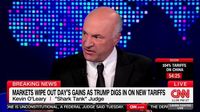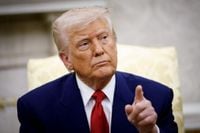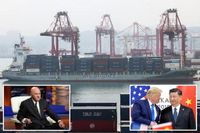In a bold move that has sent ripples through global markets, Canadian businessman and television personality Kevin O'Leary, known for his role on "Shark Tank," has called for the Trump administration to impose tariffs as high as 400% on China. O'Leary's remarks came during an appearance on CNN's "Laura Coates Live" on April 8, 2025, where he advocated for a dramatic escalation in trade pressure on Beijing, particularly in light of ongoing concerns regarding intellectual property theft and unfair trade practices.
"104% tariffs on China are not enough. I'm advocating 400%," O'Leary declared, emphasizing that the Chinese government has consistently failed to adhere to international trade rules. He expressed frustration over what he described as systemic violations of intellectual property rights, stating, "They cheat, they steal, they steal IP. I can’t litigate in their courts. They take product technology, they steal it, they manufacture it and sell it back here." O'Leary's passionate plea for tougher tariffs reflects a growing sentiment among some U.S. business leaders who feel that more aggressive measures are necessary to level the playing field.
The timing of O'Leary's comments coincides with significant volatility in global markets. Following the implementation of new U.S. tariffs and swift retaliation from China, investor anxiety has surged. On April 9, the yield on the 10-year Treasury note climbed to 4.47% before settling around 4.42%. Meanwhile, China announced it would raise tariffs on U.S. imports from 34% to 84%, further escalating tensions between the two economic powerhouses.
O'Leary's assertions were met with skepticism by CNN host Laura Coates, who questioned the feasibility of such high tariffs. However, O'Leary remained resolute, arguing that the economic pressure would force Chinese President Xi Jinping to negotiate. "Xi can only stay the Supreme Leader if people are employed," he explained. "If we wipe out any business there — because we are still 39% of all consumables on Earth and 25% of the world’s GDP — America is the number one economy on Earth with all the cards." He added, "It’s time to squeeze Chinese heads into the wall now!"
O'Leary's comments come amid a broader context of escalating trade tensions between the U.S. and China. The Trump administration has already increased tariffs on Chinese goods to over 100%, and O'Leary's call for a further hike underscores the growing frustration among some U.S. businesses regarding China's trade practices. The White House, meanwhile, has indicated that it is open to negotiations with China, with Press Secretary Karoline Leavitt stating that it was a "mistake" for China to retaliate against the U.S. tariffs.
In the wake of O'Leary's statements, market analysts are closely monitoring the situation. The recent turmoil in global markets has highlighted the interconnectedness of economies and the potential for trade disputes to have far-reaching consequences. Japan's benchmark index plunged by 3.9%, while European stocks dropped about 4%, reflecting the widespread impact of investor unease.
O'Leary's advocacy for extreme tariffs raises important questions about the future of U.S.-China relations and the potential for a trade war. As he noted, "This is not about tariffs anymore. Nobody has taken on China yet — not the Europeans, no administration for decades. As someone who actually does business there, I’ve had enough." His comments resonate with a segment of the American public who feel that China's trade practices have gone unchecked for too long.
Despite the contentious nature of the debate, O'Leary made it clear that his criticisms are directed at the Chinese government, not its people. "I have nothing against the Chinese people. They brought great literacy, art, and tech to the world. The government cheats and steals," he stated, emphasizing the need for a more equitable trading environment.
The implications of O'Leary's proposals could be significant, not only for U.S.-China trade relations but also for the global economy as a whole. As the U.S. continues to grapple with its position as the world's leading economy, the decisions made by the Trump administration in the coming weeks will be crucial in shaping the future of international trade.
In conclusion, as tensions mount and negotiations falter, O'Leary's call for 400% tariffs serves as a stark reminder of the challenges facing American businesses and the complexities of global trade. Whether such extreme measures will be implemented remains to be seen, but the discourse surrounding tariffs and trade practices is likely to intensify in the months ahead.








